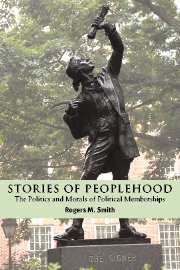Book contents
- Frontmatter
- Contents
- Acknowledgments
- Introduction: on studying stories of peoplehood
- Part I Explaining the political role of stories of peoplehood
- 1 Elements of a theory of people-making
- 2 The role of ethically constitutive stories
- Part II Constructing political peoplehood in morally defensible ways
- References
- Index
2 - The role of ethically constitutive stories
Published online by Cambridge University Press: 22 September 2009
- Frontmatter
- Contents
- Acknowledgments
- Introduction: on studying stories of peoplehood
- Part I Explaining the political role of stories of peoplehood
- 1 Elements of a theory of people-making
- 2 The role of ethically constitutive stories
- Part II Constructing political peoplehood in morally defensible ways
- References
- Index
Summary
The framework I have sketched is deliberately elementary. As in much social science, my hope is to gain substantial clarification by working out the implications of a few simple but plausible ideas. This framework generates a great many questions that may prove useful for analyzing the political processes through which forms of peoplehood are created and sustained. For example, I have already suggested that when people-building proceeds through dangerous exertions of violent force, it is likely that leaders will need to deploy stories that can inspire great sacrifices and risk-taking by at least some who fight for their side. More broadly, a whole range of issues concerning the interrelationships of force and stories are obviously crucially important. Whatever the disadvantages of people-building via certain sorts of stories – however much they may represent more subtle yet more totalizing forms of domination, as some postmodernists forcefully contend – still, they are in vital respects less brutally oppressive than the forging of political memberships through slaughter and physical coercion. It would therefore be tremendously valuable to understand the circumstances under which reliance on stories becomes impossible and resort is made to force. It would also be valuable to know more about the sorts of stories that can make the use of force seem appropriate or even desirable, and about the kinds that can minimize reliance on violence. Again, once these questions are posed, we can quickly perceive a wealth of literatures from which pertinent insights might be synthesized.
- Type
- Chapter
- Information
- Stories of PeoplehoodThe Politics and Morals of Political Membership, pp. 72 - 126Publisher: Cambridge University PressPrint publication year: 2003

